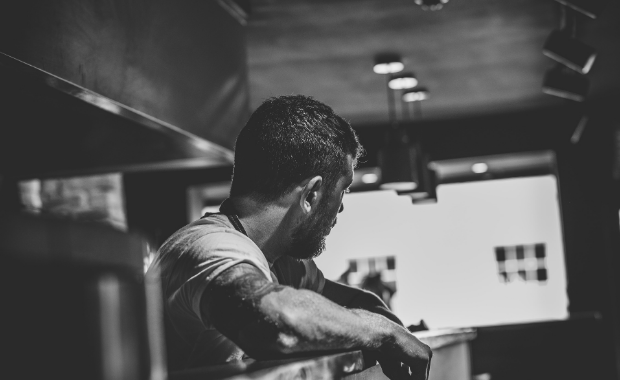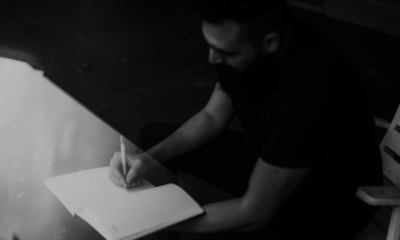Life
4 Ways to Find Yourself Again

There are many upsides to this interconnected, technologically driven world we live in today. We’re able to quickly and easily connect with people, literally, across the world. Business has become more globalized, and learning has never been more accessible or easy.
However, there are some downsides to our world as it is today also. There’s one in particular that I think is becoming a bigger and bigger issue by the day, and that is people losing themselves.
You might be wondering what I mean when I say “losing themselves” so let me explain. Now, more than ever before, people are being influenced by outside forces through things like social media. And because of that, we’ve fallen into a culture of comparison, where everyone is seeking to be like those they look up to.
The problem is, in the process of doing that, people are creating lives they don’t truly enjoy and are void of true happiness and fulfillment. Lives that are out of alignment with their core values. That’s the reason why you see trends like the number of millionaires going up every single day, while the rate of depression rises alongside it. The good news is, it’s possible to find and reconnect with yourself again.
If you’ve ever dealt with that feeling of being unhappy and disconnected from the life you want to be living, keep reading to learn four strategies to find yourself again:
1. Ask those who know you best
There are very few, if any, resources in this life that are greater than relationships. A life well lived is one filled with deep, meaningful relationships. One of the benefits of having those sorts of relationships is being able to have people to go to with things like finding yourself again.
When we go down this rabbit hole of change and transformation in the wrong direction, it becomes difficult to pull ourselves out on our own. That’s where those key relationships come in handy.
The first strategy for finding yourself again is to ask the people who know you best. These people tend to know the “real” you. They can give you insights into some of the parts of yourself that may have gotten buried under all the junk that got piled on over the years.
Asking those who know you best questions about your strengths, values, and purpose in life can go a long way in helping you rediscover who you are, what you value, and what you were put on this earth to do.
“Friendship is the hardest thing in the world to explain. It’s not something you learn in school. But if you haven’t learned the meaning of friendship, you really haven’t learned anything.” – Muhammad Ali
2. Get off social media
Like I mentioned above, social media is such an amazing tool that has so many wonderful aspects to it. But, it can also be prime real estate for an identity complex and someone really getting disconnected from themselves.
The comparison that comes from constant engagement and use of social media is a breeding ground for insecurities and/or lust of wanting to be like someone else or have their life. So, you can probably guess where I’m going with this, but a great way to reconnect with yourself is to get off of social media.
Think about it like this, if you were an alcoholic, you wouldn’t hang out in bars hoping to kick your addiction. At least not if you had high hopes of being successful. Well, if you’re struggling with feeling disconnected and are frequently on social media, maybe a good detox is in order.
It’s estimated that the average adult spends 150 plus minutes a day on social media. If you had that extra time to do the other strategies on this list, imagine how much good that would do you in finding yourself again.
3. Get into nature
If you’re feeling lost and disconnected, a great way to find yourself is to just slow down, be still, and go inward to reconnect with your thoughts and feelings. The problem is, we live in a hustle and bustle society that glorifies being busy.
And since most people live that way, finding time to be still, get quiet, and go within for answers seems impossible. For most people, long gone are the days of having a quiet space for themselves to completely disconnect without distractions.
That’s why the next great strategy for finding yourself is getting into nature. Sometimes in life we’ve got to force ourselves to go to great lengths in order to get what we want. Well, if still and quiet in order to reconnect is what you’re seeking, there isn’t a much better place to find it than out in nature.
I don’t know about you, but I can’t recall the last time I was in the middle of nowhere and had great WiFi, cars whizzing by, or social media and tv’s to fill my head with nonsense. So much of creating a desired result in life is about intention. Getting yourself out into nature and away from the distractions of the world shows that you’re serious about creating the space necessary to find yourself again.
“We need time to defuse, to contemplate. Just as in sleep our brains relax and give us dreams, so at some time in the day we need to disconnect, reconnect, and look around us.” – Laurie Colwin
4. Attend a personal growth conference or seminar
Okay, this may be the coach coming out in me, but I truly do believe that a great place to reconnect with yourself is at a personal growth conference or seminar. And I’ll tell you why.
If you’ve ever been to one of these events, you know that the primary intention is to help people overcome some sort of obstacle in their lives or get to a new level. There are two great things about these events: 1. Being able to explore your deeper desires, and 2. Being around and connecting with like minded people.
Not only do personal growth events inspire you, but they also present an opportunity for you to do some deep work on yourself and your life. That’s why you hear people talk about walking away from these types of events feeling “transformed.” It’s because they were able to engage in personal growth work that they probably weren’t making time for outside of that sort of setting.
To be clear, these types of events aren’t a “quick fix” type of thing, and shouldn’t be relied upon to fix all your issues. But, they do present a forum for you to detach from your current reality and gain some new perspective on life.
Plus, personal growth events offer great opportunities for connection. And, even better than that, connection with the right kinds of people. People who are all on a journey of personal growth and discovery. Relationships with the right people can be so catalytic in you finding yourself again, and you’ll be able to find those sorts of connections at personal growth events.
Putting it all together
Let’s be honest, having that feeling of disconnection from yourself sucks. It’s not a fun place to be. But, the good news is that there are steps that you can take when you’re feeling that way, to find yourself again.
If you do the four things I mentioned above, asking those closest to you, getting off of social media, getting into nature, and attending personal growth events, you’ll find it much easier to reconnect with who you are and get yourself back on track in life.
What advice do you have for people who are struggling to reconnect with who they truly are and getting back on track in life? Share your advice below!
Did You Know
How Skilled Migrants Are Building Successful Careers After Moving Countries
Behind every successful skilled migrant career is a mix of resilience, strategy, and navigating systems built for locals.

Moving to a new country for work is exciting, but it can also be unnerving. Skilled migrants leave behind familiar systems, networks, and support to pursue better job opportunities and a better future for their families. (more…)
Life
10 Research-Backed Steps to Create Real Change This New Year
This New Year could finally be the one where you break old patterns and create real, lasting change.

Every New Year, we make plans and set goals, but often repeat old patterns. (more…)
Life
9 Harsh Truths Every Young Man Must Face to Succeed in the Modern World
Before chasing success, every young man needs to face these 9 brutal realities shaping masculinity in the modern world.

Many young men today quietly battle depression, loneliness, and a sense of confusion about who they’re meant to be.
Some blame the lack of deep friendships or romantic relationships. Others feel lost in a digital world that often labels traditional masculinity as “toxic.”
But the truth is this: becoming a man in the modern age takes more than just surviving. It takes resilience, direction, and a willingness to grow even when no one’s watching.
Success doesn’t arrive by accident or luck. It’s built on discipline, sacrifice, and consistency.
Here are 9 harsh truths every young man should know if he wants to thrive, not just survive, in the digital age.
1. Never Use Your Illness as an Excuse
As Dr. Jordan B. Peterson often says, successful people don’t complain; they act.
Your illness, hardship, or struggle shouldn’t define your limits; it should define your motivation. Rest when you must, but always get back up and keep building your dreams. Motivation doesn’t appear magically. It comes after you take action.
Here are five key lessons I’ve learned from Dr. Peterson:
-
Learn to write clearly; clarity of thought makes you dangerous.
-
Read quality literature in your free time.
-
Nurture a strong relationship with your family.
-
Share your ideas publicly; your voice matters.
-
Become a “monster”, powerful, but disciplined enough to control it.
The best leaders and thinkers are grounded. They welcome criticism, adapt quickly, and keep moving forward no matter what.
2. You Can’t Please Everyone And That’s Okay
You don’t need a crowd of people to feel fulfilled. You need a few friends who genuinely accept you for who you are.
If your circle doesn’t bring out your best, it’s okay to walk away. Solitude can be a powerful teacher. It gives you space to understand what you truly want from life. Remember, successful men aren’t people-pleasers; they’re purpose-driven.
3. You Can Control the Process, Not the Outcome
Especially in creative work, writing, business, or content creation, you control effort, not results.
You might publish two articles a day, but you can’t dictate which one will go viral. Focus on mastery, not metrics. Many great writers toiled for years in obscurity before anyone noticed them. Rejection, criticism, and indifference are all part of the path.
The best creators focus on storytelling, not applause.
4. Rejection Is Never Personal
Rejection doesn’t mean you’re unworthy. It simply means your offer, idea, or timing didn’t align.
Every successful person has faced rejection repeatedly. What separates them is persistence and perspective. They see rejection as feedback, not failure. The faster you learn that truth, the faster you’ll grow.
5. Women Value Comfort and Security
Understanding women requires maturity and empathy.
Through books, lectures, and personal growth, I’ve learned that most women desire a man who is grounded, intelligent, confident, emotionally stable, and consistent. Some want humor, others intellect, but nearly all want to feel safe and supported.
Instead of chasing attention, work on self-improvement. Build competence and confidence, and the rest will follow naturally.
6. There’s No Such Thing as Failure, Only Lessons
A powerful lesson from Neuro-Linguistic Programming: failure only exists when you stop trying.
Every mistake brings data. Every setback builds wisdom. The most successful men aren’t fearless. They’ve simply learned to act despite fear.
Be proud of your scars. They’re proof you were brave enough to try.
7. Public Speaking Is an Art Form
Public speaking is one of the most valuable and underrated skills a man can master.
It’s not about perfection; it’s about connection. The best speakers tell stories, inspire confidence, and make people feel seen. They research deeply, speak honestly, and practice relentlessly.
If you can speak well, you can lead, sell, teach, and inspire. Start small, practice at work, in class, or even in front of a mirror, and watch your confidence skyrocket.
8. Teaching Is Leadership in Disguise
Great teachers are not just knowledgeable. They’re brave, compassionate, and disciplined.
Teaching forces you to articulate what you know, and in doing so, you master it at a deeper level. Whether you’re mentoring a peer, leading a team, or sharing insights online, teaching refines your purpose.
Lifelong learners become lifelong leaders.
9. Study Human Nature to Achieve Your Dreams
One of the toughest lessons to accept: most people are self-interested.
That’s not cynicism, it’s human nature. Understanding this helps you navigate relationships, business, and communication more effectively.
Everyone has a darker side, but successful people learn to channel theirs productively into discipline, creativity, and drive.
Psychology isn’t just theory; it’s a toolkit. Learn how people think, act, and decide, and you’ll know how to lead them, influence them, and even understand yourself better.
Final Thoughts
The digital age offers endless opportunities, but only to those who are willing to take responsibility, confront discomfort, and keep improving.
Becoming a man today means embracing the hard truths most avoid.
Because at the end of the day, success isn’t about luck. It’s about who you become when life tests you the most.
Change Your Mindset
The Four Types of Happiness: Which One Are You Living In?
Most people chase success only to find emptiness, this model reveals why true happiness lies somewhere else.

In a world driven by rapid technological growth and constant competition, many people unknowingly trade joy for achievement. (more…)
-

 Health & Fitness2 weeks ago
Health & Fitness2 weeks agoWhat Minimalism Actually Means for Your Wellness Choices
-

 News1 week ago
News1 week agoBrandon Willington Builds 7-Figure Business by Ignoring Almost Everything
-

 Did You Know2 weeks ago
Did You Know2 weeks agoWhy Most Online Courses Fail and How to Fix Them
-

 Business2 weeks ago
Business2 weeks agoIf Your Business Internet Keeps Letting You Down, Read This
-

 Business2 days ago
Business2 days agoEntrepreneur’s Guide to Pay Stubs: Why Freelancers and Small Business Owners Need a Smart Generator
-

 Business13 hours ago
Business13 hours agoThe Simple Security Stack Every Online Business Needs
-

 Finances15 hours ago
Finances15 hours agoWhy Financial Stress Is One of the Biggest Barriers to Personal Growth
-

 Scale Your Business4 hours ago
Scale Your Business4 hours ago5 Real Ways to Grow Your User Base Fast
























